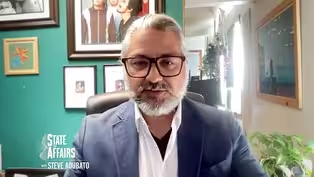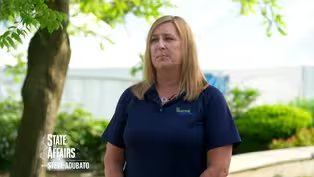State of Affairs with Steve Adubato
CEO, Robert Wood Johnson Foundation, discusses public health
Clip: Season 9 Episode 18 | 9m 5sVideo has Closed Captions
CEO of Robert Wood Johnson Foundation discusses the dangers of politicizing public health
Steve Adubato sits down with Richard Besser, MD, President and CEO of Robert Wood Johnson Foundation, to discuss the dangers of politicizing public health and New Jersey’s efforts to strengthen its healthcare infrastructure.
Problems playing video? | Closed Captioning Feedback
Problems playing video? | Closed Captioning Feedback
State of Affairs with Steve Adubato is a local public television program presented by NJ PBS
State of Affairs with Steve Adubato
CEO, Robert Wood Johnson Foundation, discusses public health
Clip: Season 9 Episode 18 | 9m 5sVideo has Closed Captions
Steve Adubato sits down with Richard Besser, MD, President and CEO of Robert Wood Johnson Foundation, to discuss the dangers of politicizing public health and New Jersey’s efforts to strengthen its healthcare infrastructure.
Problems playing video? | Closed Captioning Feedback
How to Watch State of Affairs with Steve Adubato
State of Affairs with Steve Adubato is available to stream on pbs.org and the free PBS App, available on iPhone, Apple TV, Android TV, Android smartphones, Amazon Fire TV, Amazon Fire Tablet, Roku, Samsung Smart TV, and Vizio.
Providing Support for PBS.org
Learn Moreabout PBS online sponsorship[INSPRATIONAL MUSIC STING] - Hi everyone, Steve Adubato.
We're joined once again by Dr. Richard Besser, President and Chief Executive Officer of the Robert Wood Johnson Foundation, a longtime underwriter of our health education program, and also the former Head of the CDC, acting Head of the CDC.
Dr. Besser, thank you again for joining us.
- Thanks, Steve, it's great to be here.
- Put this in perspective, in a previous segment we did with you, at the end, I mentioned that you have, in a previous time in your career, while you were a practicing pediatrician, were also a health and medical editor over at "ABC News."
The role of media, us, those of us in the media, when it comes to providing accurate, important, credible information about public health is.
- Well, I think, you know, one of the things I liked about being on ABC was the opportunity to develop a trusted relationship with the audience.
You know, similar to the relationship I would try to develop with my patients and their parents.
And you do that by being factual, by being credible, by telling people the truth, telling 'em what you know, what you don't know, so that they could establish that relationship with you and could come back as you learn more.
It's really important, the voice of media during health crises.
And I would say we are in a health crisis in America right now, one that has been constructed by the current administration.
It's very important that people have trusted voices that they can go to.
The media tends not to be high on the trust list.
It's become more and more fragmented where people are going to the sites with people they agree with.
And so- - Thank God for algorithms, huh?
- Yeah, yeah, I mean, you get the echo chamber, you know, which is why public media is so critically important.
And I think part of the reason why public media is so under attack right now, you know, having sources of information that are not polarized and politicized is very, very important.
In times like this.
finding voices who are telling you as it is and aren't simply repeating political messages is really important.
- And again, for us, and I'm not gonna get on my soapbox, our job is, again, I'm a PhD in communication, not in public health, not a "Doctor" Doctor, as my kids remind me all the time.
As Dr. Besser is a pediatrician, I wanna be clear, our job is to bring on people who don't have a political ideological point of view, but are providing valuable peer reviewed, scientific relevant, important information.
In that spirit, Dr. Besser, the Robert Wood Johnson Foundation engaged in a whole range of grant making to organizations committed to public health.
One of them is, and this is important as we're doing this program on the 18th of June, it'll be seen later, it was just announced that the Center for Health Equity and Wellbeing has been named as the State of New Jersey's Public Health Institute.
And the Robert Wood Johnson Foundation underwrites is one of the major underwriters of this initiative.
What the heck is it and why should people be aware of it and why does it matter?
- Yeah, I mean, this is really exciting news.
Public health institutes exist not in every state, but in a large portion of states.
And they're a way for resources to come into a state, through donors, through the federal government to direct at public health issues that are important to the residents of that state.
New Jersey never had a public health institute, and so there were all kinds of federal dollars that the state missed out on because it didn't have a body that could receive funds, receive them quickly, do the kind of contracting and get the work going.
So this has been a many year effort.
We participated in this with other funders within the state and with the state government to establish a public health institute.
And what's really exciting about this one is it's the first public health institute that has a focus on health equity.
And by health equity and wellbeing, what we mean is we believe in a future where health should not be a privilege, but a right.
And for that to be the case, everyone has to have the opportunity to lead their healthiest life.
And that's what equity is about, looking to see where are the barriers to health, what can you do to remove those barriers?
And this should allow more dollars to come into New Jersey to address the health issues that we face in this great state.
- By the way, team, make sure we have the website up of the Center for Health Equity and Wellbeing so people can find out more.
And I also believe they're working together with obviously the Department of Health.
Correct, Dr. Besser?
- Yeah, that's right.
Yeah.
It's not based within the Department of Health, which makes it- - It's a separate non-profit.
- Exactly.
But it is designated as the Public Health Institute for New Jersey, which allows it to work with the government and a not-for-profit organizations.
- This is a Pandora's box.
I'll do it anyway.
We have a couple minutes left.
There's always been a degree of politics or the politics of public health, but not like this.
Explain to folks from your perspective, Dr. Besser, why politicizing public health?
I am with them.
I'm with the Ds, you're with the Rs.
I'm MAGA, you're progressive.
And so we have different views on vaccines, on whatever, on government mandates.
Have you, it's a long-winded way of getting to this.
What is the danger of public health being determined, vetted, and interpreted by our political ideologies versus- - Yeah.
Yeah.
- Science.
- It's huge.
Absolutely huge.
I worked at the Center for Disease Control for 13 years under Republican and Democratic administrations.
I ran emergency preparedness and response at CDC for four years during the George W. Bush administration.
And during that time, there were many public health crises, and I would go to Congress for resources.
And there was never an inch of daylight between Democrats and Republicans on the importance of funding public health and the role it plays in terms of ensuring the health of people in our nation and around the globe.
Once it's politicized, the ability to come together, in particular during times of crisis is gone.
And, you know, I led the CDC at the beginning of the swine flu pandemic in 2009.
And the nation came together in a huge way across political parties to get the job done.
During COVID, we saw that breakdown.
We saw the major politicization of public health and public health being lifted up as the enemy by many people for political purposes.
And how we regain that trust and get away from that.
I don't know the answer to that, but it's gonna take a long time.
- We'll continue doing our part and Robert Wood Johnson Foundation does their part every day.
Dr. Richard Besser, the President and Chief Executive Officer of the Robert Wood Johnson Foundation, former acting Head of the CDC and a Pediatrician.
Dr. Besser, thank you so much for providing perspective, insight, and important information to our audience.
Thank you, Doctor.
- Thanks for having me on again.
I really appreciate it.
- You got it.
Stay with us.
We'll be right back.
- [Narrator] State of Affairs with Steve Adubato is a production of the Caucus Educational Corporation.
Funding has been provided by Hackensack Meridian Health.
Kean University.
The New Jersey Economic Development Authority.
New Jersey’s Clean Energy program.
Horizon Blue Cross Blue Shield of New Jersey.
The Port Authority of New York and New Jersey.
EJI, Excellence in Medicine Awards.
A New Jersey health foundation program.
The Turrell Fund, a foundation serving children.
And by PSE&G.
Promotional support provided by NJBIA.
And by BestofNJ.com.
- You are your child's best advocate.
No one cares more about your child's health, safety, development, and wellbeing more than you.
Empower yourself with the vaccination information you need to make the best decisions for your child.
Hackensack Meridian Health can help.
Learn more about fact-based information at hackensackmeridianhealth.org/ vaccine-facts and always talk to your child's pediatrician.
Editor of The Star-Ledger Online talks about public trust
Video has Closed Captions
Clip: S9 Ep18 | 11m 37s | Editor of The Star-Ledger Online talks about public trust (11m 37s)
NJ Sharing Network CEO talks about their 5K anniversary
Video has Closed Captions
Clip: S9 Ep18 | 7m 42s | NJ Sharing Network CEO talks about their 5K anniversary (7m 42s)
Providing Support for PBS.org
Learn Moreabout PBS online sponsorship
- News and Public Affairs

Top journalists deliver compelling original analysis of the hour's headlines.

- News and Public Affairs

FRONTLINE is investigative journalism that questions, explains and changes our world.












Support for PBS provided by:
State of Affairs with Steve Adubato is a local public television program presented by NJ PBS

